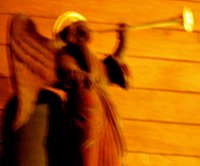
This term we are mainly agonizing about ... formation. Well, and the new BA. The returners have correctly identified that the two reasons for being at theological college as ordinands are 1) to get the bit of paper and 2) formation - a strange term thrown at you by DDOs, Bishops' Advisers and tutors. In essence it means to become the person you really are and are made by God to be - and so is not exclusive to ordination training at all. It is, or should be, what we are all aiming at. But at college it assumes a prominence that it often seems to lack in churches.
What puzzles me is how it happens. I recognise formation milestones in myself and others but not how I/you got there. During my (wonderful) placement I realised I had been formed to the extent that I had become 'clergy', that I had moved from pew to pulpit. It took a visit to my home church to jolt me into seeing that but my placement supervisor, who is responsible for preparing ordinands during the last few days before the donning of the dog collar, commented that it had happened in my first day with them. And please would I think about what it was that made that change, because knowing that would be very useful on ordination retreats when faced with the problem of moving an ordinand from 'there' to 'here' in two or three days.
Some second years want a course on formation - which I suspect sort of misses the point because it happens to you, you are formed. I think that it is about your focus moving outwards from yourself to others, and through them to God. It happens to you in the everyday, in college and among people, and has to be a very individual thing because we all start from different places. One size doesn't fit all.
And, of course, we won't leave here fully formed, just a bit more so.









